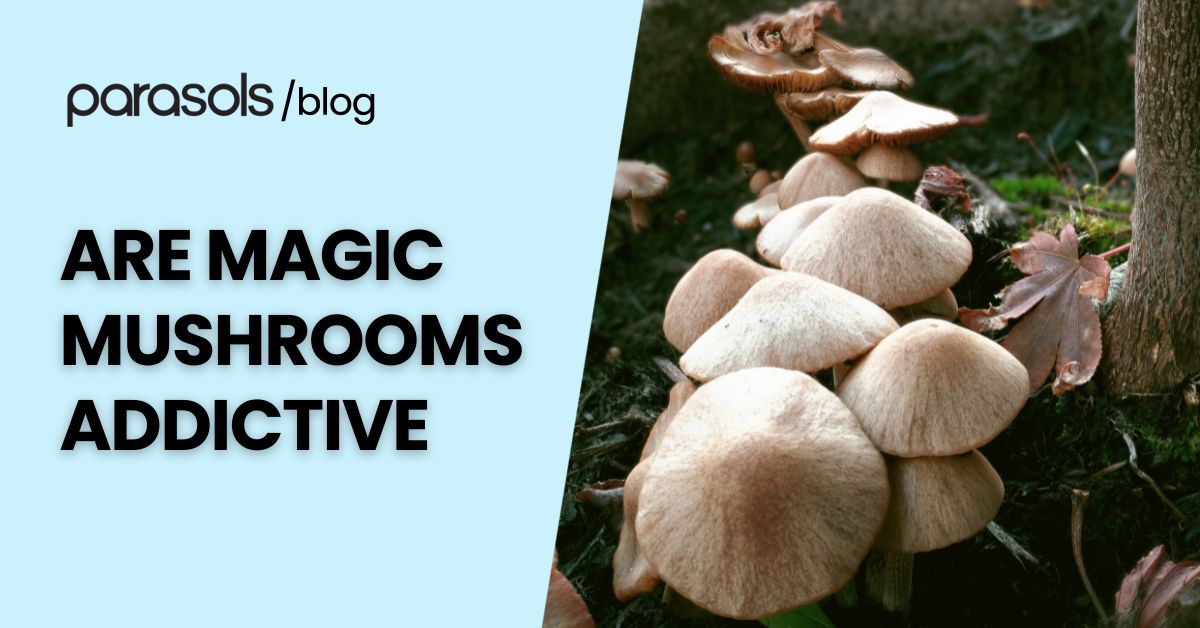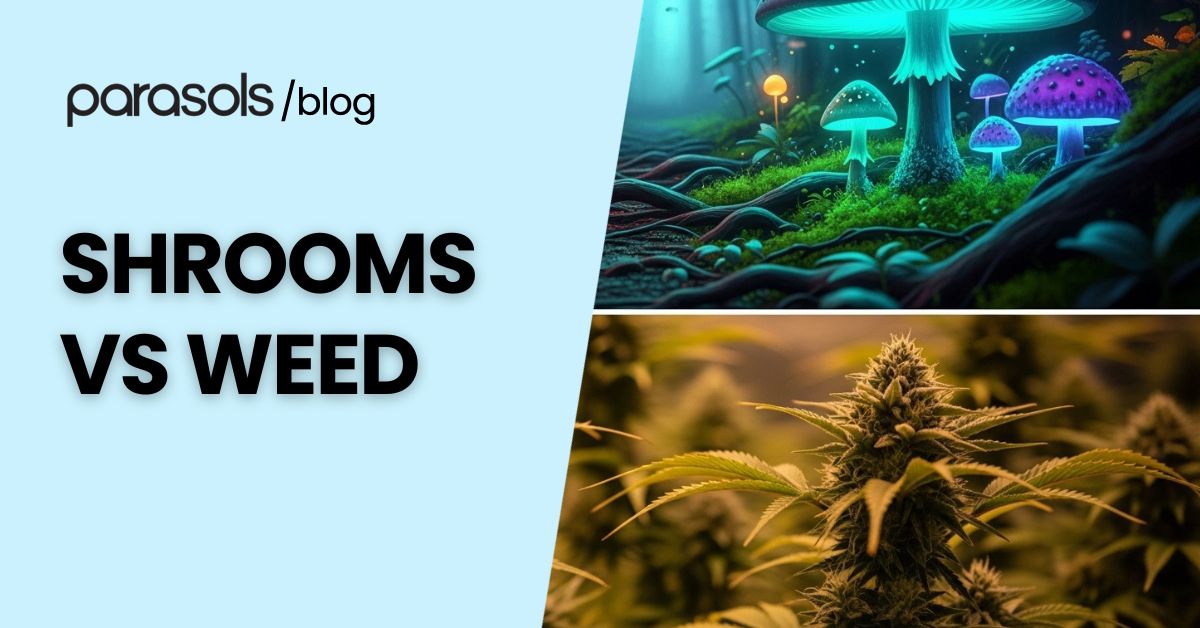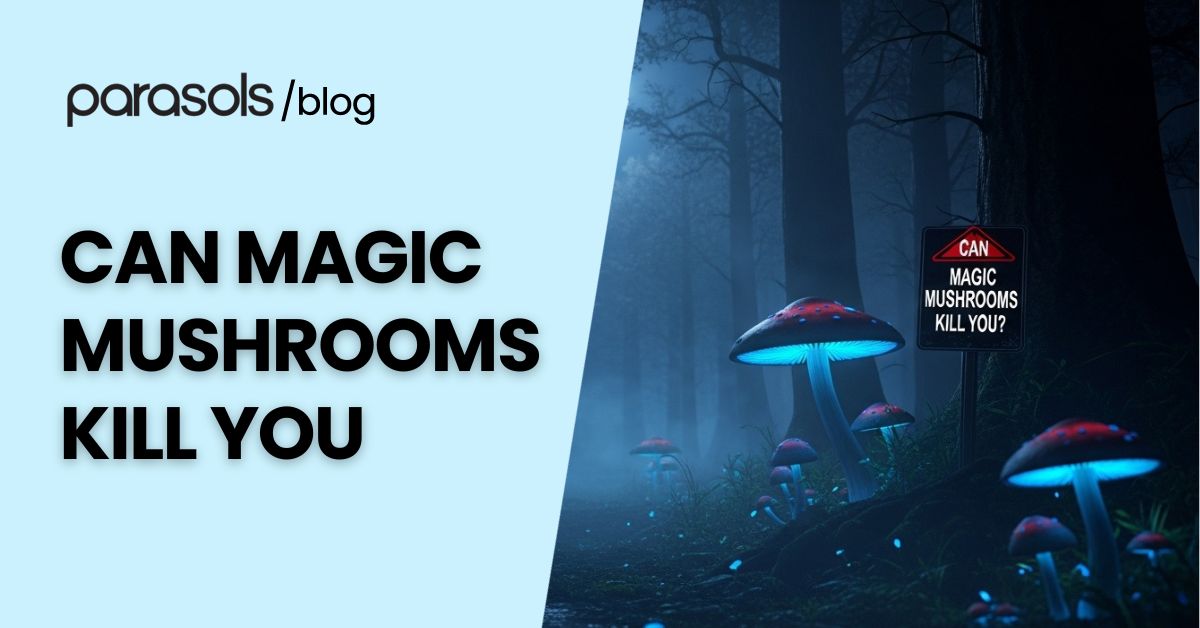Curiosity about magic mushrooms has been growing, especially as people hear more about their possible mental health benefits. But with that curiosity often comes concern — are magic mushrooms addictive?
Before studying their effects or potential therapeutic uses, it’s important to understand how psilocybin mushrooms interact with the mind and body, and what safety really means when it comes to something that can alter perception so deeply.
Key Takeaways
- Magic mushrooms are not physically addictive but can lead to psychological dependence
- Frequent use builds tolerance, pushing users to take higher doses for similar effects
- Safe use requires the right mindset, environment, and careful dosage awareness
- Mixing psilocybin with other substances or medications can cause unpredictable reactions
- Mindful, spaced-out use and clear intentions reduce the risk of dependency or harm
Are Magic Mushrooms Addictive?
Magic mushrooms aren’t considered physically addictive like some other drugs, but that doesn’t mean they’re risk-free. The psychoactive compound psilocybin doesn’t typically cause physical dependence or withdrawal symptoms, yet people can still develop a psychological dependence — craving the altered perception or emotional escape they provide.
Frequent or careless psilocybin use can also lead to tolerance, meaning users may take larger amounts to feel the same effect, which increases the chances of bad trips and other negative consequences.
How to Consume Magic Mushrooms Safely

Curiosity about psilocybin mushrooms is understandable, especially as conversations around mental health and potential therapeutic benefits grow. But safe, informed use matters — psilocybin is a powerful psychoactive compound that affects mood, perception, and emotions. Here’s how to approach it responsibly and reduce the potential risks.
Start with the Right Mindset and Environment
Your mindset and surroundings play a big role in how you experience psilocybin magic mushrooms. Stay calm, positive, and free from stress or negative emotions before taking mushrooms. Choose a safe, comfortable space with trusted people — never mix psilocybin use with other drugs or alcohol.
Know the Dosage
Different types of mushrooms contain varying levels of psilocybin, so it’s crucial to start small, especially for beginners. Taking too much can lead to intense hallucinations, dissociative effects, or even psychological distress. If possible, consult a healthcare provider familiar with psychedelic use or seek medical supervision.
Avoid Frequent Use
Prolonged use can dull the effects of psilocybin, making you feel the need for higher doses to achieve the same effect. This can increase your risk of developing psychological dependence and other long-term consequences. Allow enough time between experiences to reset your tolerance.
Never Mix with Other Substances
Combining psilocybin with other drugs can lead to unpredictable physical effects — from increased blood pressure and muscle weakness to nausea and vomiting. Such combinations can also heighten depressive symptoms or trigger anxiety, especially in individuals with mental health disorders.
Seek Support if Needed
If you notice that psilocybin use is affecting your personal and professional lives or leading to compulsive behavior, reach out for professional help. Behavioral therapies, support groups, or addiction treatment programs can help you find healthier coping mechanisms.
Tips to Avoid Shroom Dependency
While psilocybin mushrooms may not be physically addictive, it’s still possible to develop habits that lead to overuse or dependence. Staying mindful of how and why you’re taking them can make all the difference. Here are a few tips to help you maintain balance and avoid dependency:
- Set Clear Intentions: Before taking mushrooms, understand your reasons — whether it’s curiosity, self-reflection, or spiritual understanding. Clear intentions reduce the risk of impulsive or frequent use.
- Avoid Using as an Escape: If you’re turning to psilocybin use to avoid stress, sadness, or mental health issues, you may be building a psychological dependence. Try healthier coping mechanisms like journaling, therapy, or meditation.
- Space Out Your Experiences: Prolonged use can increase tolerance and reduce the effects of psilocybin. Waiting several weeks between sessions allows your brain to reset and lessens the urge to chase the same effect.
- Stay Informed About Health Risks: Understand the potential risks and negative consequences of abusing psilocybin mushrooms. Be aware of hallucinogen persisting perception disorder, physical effects like muscle weakness or nausea, and the possibility of bad trips.
- Connect with Support Networks: If you find it difficult to cut back, consider joining support groups or seeking professional help. Addiction treatment and behavioral therapies can guide you toward more mindful use.
Final Thoughts

In the end, exploring magic mushrooms safely comes down to awareness and intention. They can offer deep insight, connection, and emotional release when used mindfully — but they also require respect for their power and potential risks.
If you’re curious about their effects or wondering how they might support your personal growth, learn more about magic mushrooms and how to learn them safely.
Frequently Asked Questions
Can you build tolerance to magic mushrooms?
Yes. Regular or frequent psilocybin use can quickly lead to tolerance, meaning the same amount produces weaker effects over time. This often pushes users to take higher doses, which raises the risk of bad trips, psychological distress, and unpredictable physical effects like increased blood pressure or nausea. Taking long breaks between sessions helps reset your body’s sensitivity to psilocybin.
What should I do if someone has a bad trip?
If someone is experiencing intense hallucinations, anxiety, or panic during a bad trip, keep them calm and in a safe, quiet environment. Avoid arguing or using harsh words — reassurance and grounding are key. Encourage them to breathe slowly and remind them that the effects will pass. If symptoms escalate to physical distress or confusion, seek medical attention immediately.
Are all mushrooms that cause hallucinations safe to eat?
No. Certain types of mushrooms contain psilocybin, but many others are toxic mushrooms that can cause severe mushroom poisoning or even death. Some poisonous mushrooms closely resemble psilocybin mushrooms, making it dangerous to identify them without expertise. Always source from a trusted, verified provider — never consume wild mushrooms unless identified by an expert.
Can psilocybin mushrooms interact with mental health medications?
Yes. Psilocybin affects serotonin receptors in the brain, which can interact with antidepressants, mood stabilizers, or antipsychotic medications. These combinations may reduce psilocybin’s effects or, in some cases, increase the risk of serotonin syndrome or psychological distress. Always consult a healthcare provider before taking psilocybin if you’re on any mental health medications.
Is psilocybin legal everywhere?
No. The legal status of psilocybin varies widely across countries and even states or provinces. Some areas have decriminalized its possession or use for personal or therapeutic purposes, while others still classify it as an illegal substance. Always check your local laws before obtaining or consuming psilocybin mushrooms.
What are the long-term effects of psilocybin use?
While many users report lasting positive shifts in perspective, prolonged or reckless use can lead to long-term consequences such as tolerance, anxiety, or hallucinogen persisting perception disorder (HPPD). This condition causes visual distortions or flashbacks long after the trip ends. Using psilocybin with moderation, intention, and medical supervision helps lower these risks.



Leave a comment
All comments are moderated before being published.
This site is protected by hCaptcha and the hCaptcha Privacy Policy and Terms of Service apply.